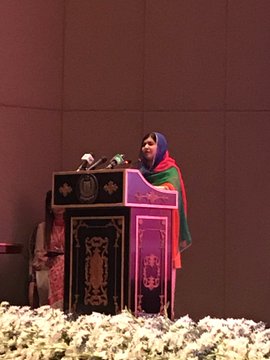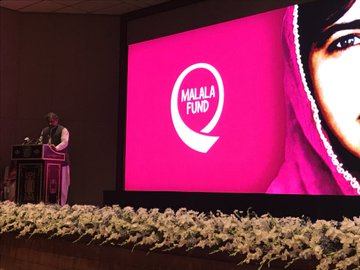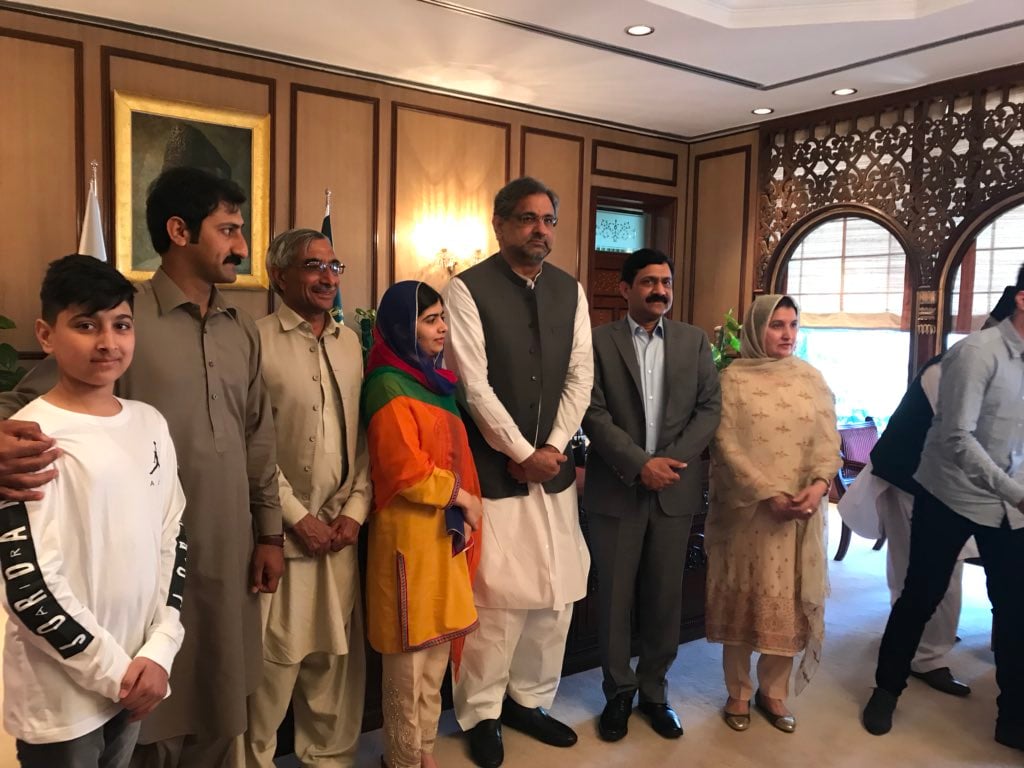Nobel peace laureate Malala Yousafzai returned to Pakistan Thursday, saying tearfully that it was "a dream" to come home for the first time since she was airlifted to Britain after being shot in the head by a Taliban gunman more than five years ago.
The 20-year-old was overcome with emotion as she made a televised speech from the Prime Minister´s House in Islamabad, wiping away tears as she spoke of the beauty of her native Swat valley.
"Always it has been my dream that I should go to Pakistan and there, in peace and without any fear, I can move on streets, I can meet people, I can talk to people.
"And I think that it´s my old home again ... so it is actually happening, and I am grateful to all of you."
Prime Minister Shahid Khaqan Abbasi welcomed her and assured her that the government will provide all possible assistance during her stay here. "Welcome home," PM Abbasi told Yousafzai. "When she went away, she was a child of 12. She has returned as the most prominent citizen of Pakistan."
Yousafzai spoke of the importance of education and about the efforts of her charitable foundation to help girls, often switching between English and the Pashto and Urdu languages.
The 20-year-old´s unannounced arrival with her parents under tight security at Islamabad´s international airport overnight has been met with a tsunami of social media reaction, with many Pakistanis hailing her bravery but others accusing her of a conspiracy to foment dissent.
Malala is widely respected internationally for her activism, but opinion is divided in Pakistan where some conservatives view her as a Western agent on a mission to shame her country.
She met with Prime Minister Shahid Khaqan Abbasi earlier today along with her family. Minister for Information Technology Anusha Rehman, Chairperson of Benazir Income Support Programme (BISP) Marvi Memon and Adviser to the PM Musaddiq Malik were also present on the ocassion.
"She will be meeting several people here but her itinerary is not being disclosed due to security reasons," foreign office spokesman Muhammad Faisal told AFP.
"We welcome Malala.... She is back home. It is a positive development," he said, calling her "one of our young and brilliant daughters" and adding that Pakistanis should respect her.
Residents of Malala´s native Swat valley, where she lived until the shooting, said they were happy to see her return.
"I had not imagined that she would ever come (back)," Rida Siyal, a student who said she had been a "good friend" of Malala´s before the shooting, told AFP.
"(She) defeated the dark force of fear. We are delighted to see her back," she said.
Ahmad Shah, who said he was a friend of Malala´s father, called her a "symbol of courage", adding: "She should have returned home much earlier".
Malala became a global symbol for human rights after a gunman boarded her school bus in Swat on October 9, 2012, asked "Who is Malala?" and shot her.
She was treated for her injuries in the British city of Birmingham, where she also completed her schooling.
The youngest ever winner of the Nobel Peace Prize in 2014, she has continued to be a vocal advocate for girls´ education while pursuing her studies at Oxford University.
"I welcome #MalalaYousafzai the brave and resilient daughter of Pakistan back to her country," politician Syed Ali Raza Abidi wrote on Twitter, one of many Pakistanis expressing joy at her return, despite ongoing security fears.
But pockets of intense criticism also emerged among some Pakistanis who view her negatively, including religious extremists as well as members of the conservative middle class who support education for girls but object to airing the country´s problems abroad.
- ´Malala is not your enemy´ -
One leading Pakistani journalist, Hamid Mir, issued a plea for opposition politicians and commentators to exercise restraint when talking about the visit.
"International media is highly focused on her return and this (bad language) will damage Pakistan´s image," he said.
Other Pakistanis echoed his concerns on social media.
"Dear Pakistanis! Malala is not your enemy. Your enemies were those monsters who shot her point blank on her way to school," wrote Twitter user Shahira Lashari.
Malala began her campaign aged just 11, when she started writing a blog -- under a pseudonym -- for the BBC´s Urdu service in 2009 about life under the Taliban in Swat, where they were banning girls´ education.
In 2007 the militants had taken over the area, which Malala affectionately called "My Swat", and imposed a brutal, bloody rule.
Opponents were murdered, people were publicly flogged for supposed breaches of sharia law, women were banned from going to market, and girls were stopped from going to school.
But it was only after the shooting, and a subsequent near-miraculous recovery, that she became a truly global figure.
She opened a Twitter account on her last day of school in July 2017 and now has more than a million followers.
"I know that millions of girls around the world are out of school and may never get the opportunity to complete their education," Malala wrote at the time.
During a recent appearance at the World Economic Forum in Davos, the feminist campaigner urged women to "change the world" without waiting for the help of men.
"We won´t ask men to change the world, we´re going to do it ourselves," Malala said.
"We´re going to stand up for ourselves, we´re going to raise our voices and we´re going to change the world."
https://www.thenews.com.pk/latest/297846-malalas-arrival-in-pakistan-likely-tonight-sources






No comments:
Post a Comment